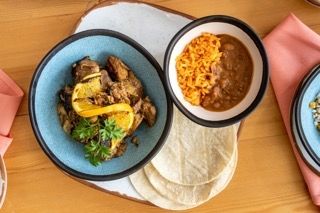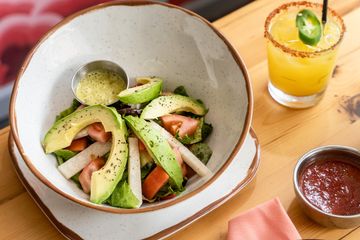Experience signature craftsmanship with hand crafted margarita served chilled
Wiki Article
Is Mexican Food Healthy? Unpacking the Nutritional Perks of Typical Ingredients
The concern of whether Mexican food is healthy and balanced invites an exploration of its standard active ingredients. Beans and corn serve as foundational staples, rich in protein and fiber. Avocados give useful fats, while different herbs and flavors add flavor and health and wellness advantages - mexican food. With each other, these components create a tapestry of nutrition. The healthfulness of Mexican food usually depends on prep work approaches and part sizes. What function do these elements play in identifying its overall nutritional worth?The Power of Beans: Healthy Protein and Fiber-Rich Staples
Often ignored, beans serve as a foundation of Mexican cuisine, providing a riches of nutritional benefits. Rich in protein, they are a superb plant-based choice for those seeking to meet their nutritional healthy protein needs. This high healthy protein material sustains muscle mass repair and development, making beans very useful for both meat-eaters and vegetarians alike. Furthermore, beans are an extraordinary resource of dietary fiber, which aids in food digestion and advertises a feeling of volume, potentially aiding with weight monitoring.The range of beans utilized in Mexican dishes, such as black beans, pinto beans, and kidney beans, adds to a varied flavor account and can enhance dishes nutritionally. Additionally, beans are low in fat and have important vitamins and minerals, consisting of iron, folate, and magnesium. Together, these qualities make beans an essential active ingredient, delivering both nutrients and sustenance in traditional Mexican price.

Corn: a Versatile Grain With Nutritional Advantages
Corn sticks out as a functional grain fundamental to Mexican cuisine, celebrated not only for its culinary applications but additionally for its remarkable dietary account. As a key active ingredient in recipes like tortillas, tamales, and pozole, corn provides important nutrients that contribute to a balanced diet. Rich in carbohydrates, it acts as a significant energy source, while also being reduced in fat, making it a favorable option for numerous nutritional demands.Corn is a great source of nutritional fiber, which assists in food digestion and promotes satiety. It contains substantial quantities of vitamins such as B-complex vitamins, which are necessary for power metabolic process. The existence of antioxidants, specifically carotenoids, adds to general health by reducing oxidative stress and anxiety. In addition, corn is gluten-free, satisfying those with gluten sensitivities. Overall, the dietary advantages of corn highlight its relevance in conventional Mexican food and its duty in a healthy and balanced diet regimen.
Avocados: Healthy Fats and Nutrients in Every Bite
Avocados play a significant role in Mexican food, complementing dishes with their velvety appearance and abundant flavor. Past their cooking appeal, avocados are commemorated for their outstanding nutritional account. They are a rich resource of healthy monounsaturated fats, which can aid lower negative cholesterol levels and assistance heart health. In addition, avocados are packed with essential nutrients, including potassium, vitamin E, and B vitamins, adding to overall health.The high fiber content in avocados help digestion and advertises satiation, making them a useful enhancement to any type of dish. Their distinct nutrient make-up can additionally support skin health and give anti-inflammatory benefits. Integrating avocados right into conventional Mexican meals or enjoying them as a standalone snack can boost both taste and nutrition, showing why they are a precious staple in Mexican cuisine. Generally, avocados supply a delicious means to take pleasure in healthy and balanced fats and important nutrients in every bite.

Seasonings and Herbs: Flavorful Health Boosters
While enjoying the rich flavors of Mexican food, one can not overlook the necessary function that spices and natural herbs play in enhancing both preference and wellness. Active ingredients such as chili, oregano, and cilantro peppers not just add to the lively flavor profile but also provide substantial wellness advantages. Cilantro is known for its detoxing properties, aiding to get rid of heavy steels from the body, while oregano is loaded with antioxidants and has anti-inflammatory impacts.Chili peppers, a staple in many Mexican meals, include capsaicin, which has actually been connected to improved metabolic rate and pain relief. In addition, spices like cumin and coriander assistance food digestion and may aid in blood sugar level policy. Including these delicious health boosters right into meals not just improves the culinary experience however also advertises overall wellness, making Mexican food not just scrumptious, yet likewise nutritionally advantageous.
Standard Cooking Techniques: Enhancing Nourishment and Flavor
Typical cooking approaches in Mexican food play an important duty in enhancing both nourishment and taste, as they usually prioritize time-honored methods and fresh active ingredients. Techniques such as nixtamalization, where corn is saturated and prepared in an alkaline solution, not only boost the nutrient profile of tortillas however likewise boost their digestibility - churros. Furthermore, using sluggish food preparation methods, like stewing or braising, allows flavors to blend perfectly while keeping the stability of the active ingredients
Regularly Asked Questions
Are Mexican Food Portions Commonly Larger Than Other Foods?
Mexican food portions are usually larger than those of several other foods. This characteristic shows typical dining methods, emphasizing communal sharing and hearty dishes, which can lead to a much more substantial serving dimension on the whole.
How Does the Prep Work Approach Affect Healthiness of Mexican Food?
Preparation techniques greatly influence the healthfulness of Mexican food. Methods such as cooking or steaming preserve nutrients, while frying can raise harmful fat content. Selections of active ingredients and cooking designs ultimately identify general dietary worth.Can Mexican Food Be Customized for Certain Nutritional Constraints?
Mexican food can indeed be tailored for specific dietary constraints. Substitutions, such as using corn tortillas for gluten-free diets or integrating even more vegetables, enable individuals to delight in conventional flavors while fitting different nutritional requirements.What Prevail Mistaken Beliefs About Mexican Food and Health?
Common mistaken beliefs concerning Mexican food consist of the idea that it is naturally unhealthy, overly spicy, and solely concentrated on fats. Actually, standard recipes commonly include nutritious ingredients and can be customized to various dietary demands.Exist Much Healthier Alternatives at Mexican Restaurants?
Much healthier alternatives at Mexican restaurants usually consist of smoked meats, beans, and fresh vegetables. Choosing recipes that highlight whole components and staying clear of hefty sauces can bring about an extra nutritious dining experience, advertising total wellness.The variety of beans made use of in Mexican dishes, such as black beans, pinto beans, and kidney beans, adds to a diverse flavor profile and can improve dishes nutritionally. Avocados play a considerable duty in Mexican cuisine, complementing recipes with their creamy appearance and rich flavor. Incorporating avocados right into conventional Mexican dishes or appreciating them as a standalone snack can boost both flavor and nourishment, demonstrating why they are a precious staple in Mexican cuisine. While appreciating the rich tastes of Mexican cuisine, one can not forget the necessary role that spices and natural herbs play in enhancing both preference and health. Standard cooking methods in Mexican food play an important duty in enhancing both nourishment and taste, as they typically focus on fresh components and classic techniques.
Report this wiki page